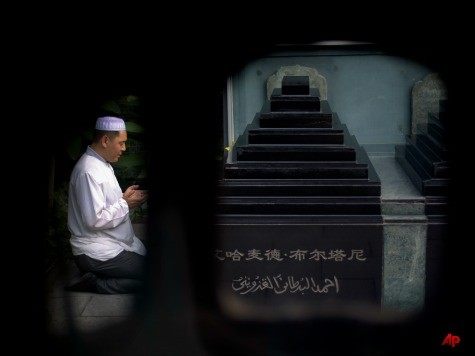As the Muslim holy month of Ramadan arrives this week, Chinese officials are reportedly forcing everyone from Communist Party members to schoolteachers to vow they will not participate in the traditional fast during this month, or exhibit their religion in any way. The ban follows similar restrictions in western Xinjiang province last year.
Reuters reports that Chinese party officials are targeting anyone in Xinjiang of ethnic Uyghur background with a prominent position in their communities, including “party members, civil servants, students, and teachers in particular.” In addition to personal targeting, the report claims that government websites and state media in the region have issued official notices against Ramadan. In one Xinjiang county, those approached to vow not to fast were forced into “guaranteeing they have no faith, will not attend religious activities and will lead the way in not fasting over Ramadan.”
Restaurants in the large western province have also been encouraged to remain open during the day. Muslim restaurants often close during Ramadan hours, when fasting is scheduled to occur from sunrise to sunset.
China’s minority Uyghur population is mostly Muslim and lives in western Xinjiang, hundreds of miles from Beijing. The communist Chinese government, secular by definition, has issued especial restrictions on Islam, following a number of attacks deemed terrorist by the national government, which officials have claimed were motivated by Islamist extremism. The most recent attack occurred this week; Chinese police shot a man to death at a Xi’an rail station; he allegedly attempted to attack train travelers with a cement block.
Chinese officials banned Ramadan entirely last year in Xinjiang and issued an order banning Islam entirely in Xinjiang’s public places in December. Not only are residents banned from practicing their religion in public places, but the government established a new penalty carrying a fine as high as $5,000 for religious-themed social media and Internet posts that “undermine national unity.” Authorities have also forbidden minors from following any religion at all in the region, forcing parents to sign pledges vowing they would not expose their children to religion.
While China has also made moves to suppress the growing popularity of Christianity–which is affecting the majority ethnic Han population, not just minorities–it has more heavily targeted Islam in the wake of propaganda aimed at Chinese Muslims from groups such as the Islamic State. Most recently, China has forced shops in Xinjiang to sell alcohol and cigarettes, both forbidden by Islam, in an attempt to culturally integrate western Muslims with the rest of the country and, bluntly, to “weaken religion.” Burqas, beards, and Islamic garb generally have all been banned in public in Urumqi, the Xinjiang capital. Somewhat contradictorily, however, China has also invested in helping native Muslims make their hajj to Mecca, Saudi Arabia, sending up to 14,000 Chinese Muslims to Mecca in 2014.

COMMENTS
Please let us know if you're having issues with commenting.